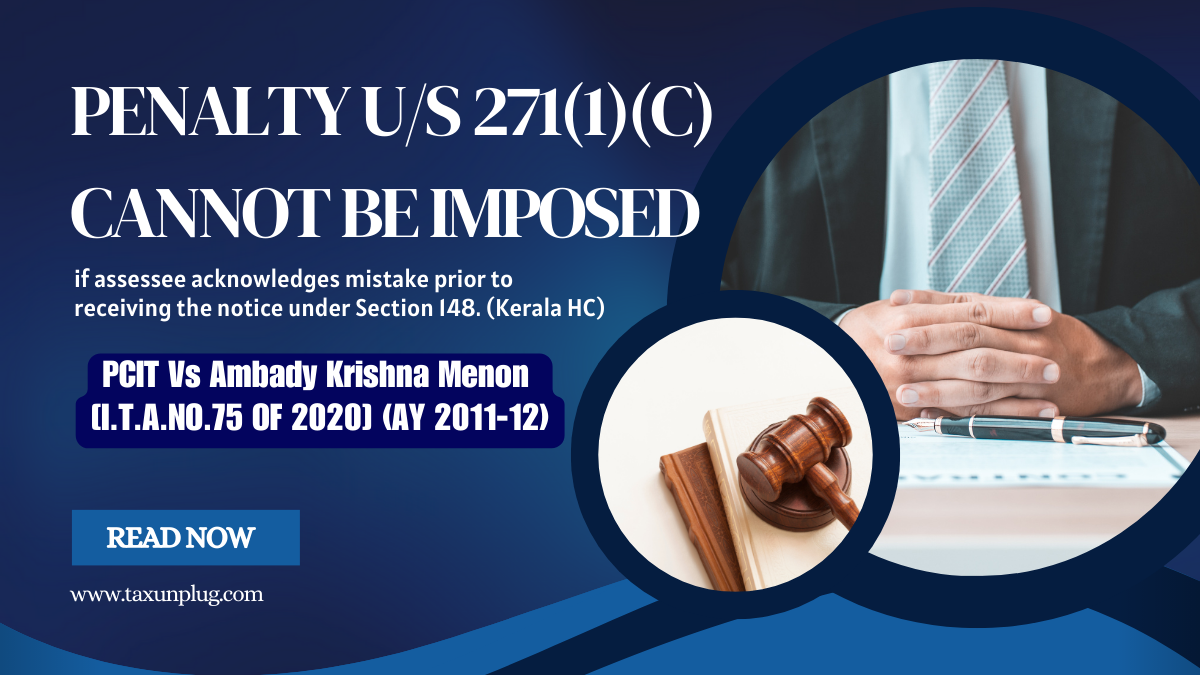PCIT Vs Ambady Krishna Menon [I.T.A.NO.75 OF 2020] (AY 2011-12)
The assessee filed his return of income for A.Y 2011-12 with a capital gain of Rs.37,66,168/-, which was processed under Section 143(1) of the Income Tax Act, 1961. The Revenue noticed a potential suppression of the capital gain, leading to a summons under Section 131 of the Act to determine if any income suppression occurred.
The assessee requested time for providing details, which the Department granted. The assessee provided the details on 13.06.2014. After reviewing his return, he realized he had erroneously included the cost of bonus shares under capital gains on the sale of equity shares of a company. This mistake occurred while working the capital gain tax based on the indexed value of equity shares. The assessee paid the differential tax on the differential amount of Rs.15,82,63,937/- computed under the capital gain head.
The Revenue then proceeded to issue a notice under Section 148 of the Act for the purposes of reassessing the tax by including the escaped income. On receipt of the said notice, the assessee proceeded to file a fresh return u/s 148 including the differential amount of capital gain computed and intimated by him to the Department.
The assessee paid a total of Rs.3,42,63,389/- for tax and interest liability for the A.Y. 2011-12, along with the return filed under Section 148 of the Act. The Revenue completed the assessment under Section 143(3) r.w.s.147 of the Act.
It is significant to note that in the assessment order so passed, there was no addition to the income of the assessee, to the extent already admitted by him. The issue that arises for consideration in this appeal was not about the assessment completed against the assessee, but regarding the penalty that was imposed on him under Section 271(1)(c) of the Act immediately thereafter.
The Revenue proposed the imposition of a penalty on the assessee on the ground that the assessee had concealed particulars of his income or furnished inaccurate particulars of such income the said notice did not clearly mention which of the two grounds i.e., concealment of income or furnishing inaccurate particulars of income formed the basis on which the notice for penalty had been issued.
Notwithstanding the aforesaid discrepancy in the notice, the assessee preferred a detailed reply citing reasons as to why a penalty under Section 271(1)(c) could not be imposed on him. The explanation of the assessee did not however find favour with the Assessing Authority and confirmed a penalty equal to 100% of the tax allegedly sought to be evaded, viz., Rs.3,26,57,795/- on the assessee.
The Kerala High Court considered whether the requirements for triggering Section 271(1)(c) had been met. This particular provision imposes penalties in cases of concealing or providing inaccurate details of income. The court stressed that the Assessing Authority must be satisfied with these conditions during proceedings initiated under the Income Tax Act.
The court observed that the assessee had acknowledged the mistake prior to receiving the notice under Section 148, thereby averting any attempt to conceal income. Furthermore, it emphasized that the Revenue had accepted the taxpayer’s explanation during the assessment process. Moreover, the court examined the flawed penalty notice that lacked clear grounds for imposing penalties.
The court concluded that the penalties under the Income Tax Act cannot be imposed on the assessee’s honesty. The court stressed the significance of a rigorous interpretation of penal provisions to ensure that only evident cases of wrongdoing are penalized. Considering the situation where the assessee willingly admitted the mistake and promptly paid the extra tax, imposing penalties would be unjust and contradictory to the principles of justice.
The Kerala High Court has ultimately rejected the Income Tax Appeal, affirming the revocation of the penalty imposed on the assessee. This ruling emphasizes the significance of transparency and fairness in tax management, emphasizing the crucial need for thorough adherence to procedural obligations when penalizing taxpayers.
To download official order, click here.
“The site is for information purposes only and does not provide legal advice of any sort. Viewing this site, receipt of information contained on this site, or the transmission of information from or to this site does not constitute an attorney-client relationship.
The information on this site is not intended to be a substitute for professional advice.”

